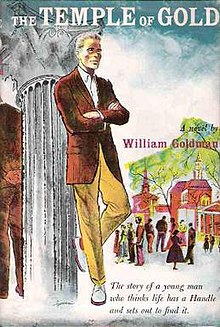The Temple of Gold
 From Wikipedia the free encyclopedia
From Wikipedia the free encyclopedia
 First edition | |
| Author | William Goldman |
|---|---|
| Country | United States |
| Language | English |
| Publisher | Knopf |
Publication date | 14 October 1957 |
| Pages | 277 |
The Temple of Gold is a 1957 novel by William Goldman. It was Goldman's first novel, and launched his career.
Background[edit]
The novel was written in three weeks over the summer he graduated from college, in June–July 1956.[1] Goldman had never written a novel before, but had several years experience writing short stories, though none had been published.
The title Temple of Gold was taken from the film Gunga Din.[2] Another influence on the book was the novel Bonjour Tristesse.[3] Goldman had recently done military service and met a man who had an agent. He sent the novel to the agent, and through him got representation from Joe McCrindle. McCrindle sent it to Knopf, who accepted it for publication.[4][5] Goldman said Knopf:
Wanted me to double it in length and I didn't know what to do about that... That's still the most amazing thing I've ever heard any young writer be told. I was able to do it through some kind of madness but, Jesus, it's an insane thing for an editor to say.[6]
Goldman says he has "no idea why" Knopf accepted the novel "but one of the things that happened, there was an interest in publishing books by young writers and I was one of those writers who basically got picked up along with it."[7] Goldman later reflected:
I never would have continued as a writer if The Temple of Gold had not been taken by the first publisher I sent it to. I'm not that masochistic. There was no way I was going to write anymore. I didn't know that then, but I know it now. There was no encouragement; no one ever said I had any talent. I had never written anything much over two pages long. I had done badly in school in terms of writing. I did not want to be a failure, but I did not have the courage to write a second book if the first had not been accepted.[8]
A 2001 Ballantine paperback edition of the novel included as an afterword a first chapter removed by Knopf.[9]
Reception[edit]
According to Goldman, "the book, like most of my books, got crucified in hardcover and was a very, very successful book in paperback. Most of the books that I've written had their success in paperback."[10]
Film Adaptation[edit]
Walt Disney Studios Motion Pictures purchased the film rights to the movie.
References[edit]
- ^ RALPH TYLER (Nov 12, 1978). "Butch Cassidy' Was: My Western, 'Magic' Is My Hitchcock' 'Magic' Is My Hitchcock". New York Times. p. D23.
- ^ "William Goldman, Which Lie Did I Tell?". Bloomsbury. 2000. pp. 243–244.
- ^ Egan p 14
- ^ Egan p 9
- ^ "William Goldman, an Early Success". Chicago Tribune. Aug 2, 1964. p. l1.
- ^ Egan p 9
- ^ Egan p 10
- ^ Richard Andersen, William Goldman, Twayne Publishers, 1979 p 26
- ^ Egan p 16
- ^ Egan p 18
- Egan, Sean, William Goldman: The Reluctant Storyteller, Bear Manor Media 2014